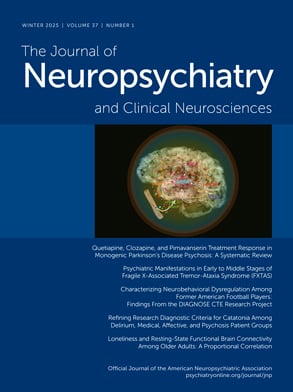To the Editor: Traumatic brain injury (TBI) is frequently complicated by alterations in mood and behavior; there is a threefold increased prevalence of personality disorders after TBI.
1 We present preliminary data from an ongoing study on personality traits pre- and post-TBI. Patients with first-time closed head injuries were recruited from the trauma unit of the Johns Hopkins Hospital and the Brain Injury Unit of Kernan Hospital, University of Maryland (Baltimore). Participants were evaluated twice: initially, within the first 3 months of TBI, and then 12 months post-TBI. Their personality profiles were captured with the 60-item abbreviated version of the NEO Personality Inventory (NEO-PI-R), called the NEO Five-Factor Inventory (NEO-FFI).
2 Raw scores of the NEO-PI-R were transformed to percentile scores, using published norms for age and gender.
3 In order to evaluate pre-TBI (i.e., “premorbid”) personality characteristics, at the baseline visit, a friend or family member was instructed to report retrospectively on the participant's personality traits as observed pre-TBI (“Baseline”);
t-tests for paired samples were done to examine the differences between baseline and 12-month personality scores. Multilinear regression analysis was conducted to assess correlates of personality traits, controlling for baseline NEO-PI-R factor scores.
There were a total of 41 participants who completed the NEO-PI-R profiles at baseline and 12 months. Extraversion and Openness decreased from baseline (as compared with pre-TBI traits) to 12 months. The changes were small in magnitude, with percentile decreases of 10.9 points for Extraversion and 5.1 points for Openness. After correcting for multiple comparisons, there were no statistically significant associations between post-TBI personality traits and baseline clinical variables, including age, gender, living situation, employment, race, education, presence of frontotemporal lesion (as assessed by computerized tomography scans), Lawton Activities of Daily Living Scale, Glasgow Coma Scale score, or the presence of any psychiatric diagnosis post-TBI, including substance abuse disorder, mood disorder, anxiety disorder, or personality change. These findings are similar to those of Kurtz et al.,
4 who found stability of personality traits post-TBI. Our current results suggest that a relatively small change in personality traits post-TBI acts as a marker of traumatic brain injury, but not injury severity or complications. We recommend that future research include better-powered studies of longer duration, using personality assessments as close to the time of injury as possible and using more sensitive imaging methods, including MR and diffusion tensor imaging.
Acknowledgments
This work was supported by Grant K23 MH 066894 from the NIMH (Rao). Dr. Rao has a grant from Forest to conduct a clinical trial in post-TBI depression and a grant from Pfizer to conduct a clinical trial in post-stroke anxiety. Dr. Paul Rosenberg and Ms.Bergey, who is his research assistant, are involved in clinical trials supported by pharmaceutical companies (Merck, Forest, Elan, Pfizer, Eli Lilly).

